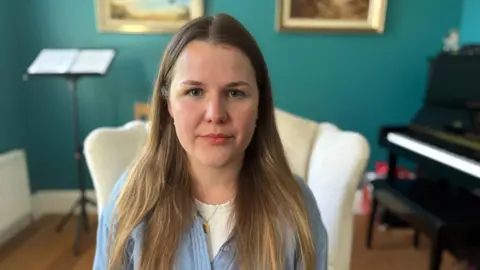'The stranger who raped me shouldn't be deported early'
 Supplied
SuppliedOn a summer's night in July 2019, Kate was out with one of her best friends. They had cocktails and went dancing. That evening, she was taken to a stranger's flat and raped.
The man responsible, Albanian national Miridon Bera, was convicted and jailed in March 2023, but may now be transferred to prison in his home country after serving a little over two years of his eight-and-a-half-year sentence in the UK.
Kate - who has waived her anonymity, but whose name we have changed - was told at the point of conviction that Bera would be deported at the end of his sentence.
However, she has since been shocked to discover he could be deported even sooner.
The Home Office has told the BBC "foreign national offenders who commit serious sexual crimes face deportation at the earliest opportunity".
However, Kate feels strongly that Bera should serve the rest of his sentence in the UK before being repatriated.
Warning: Readers may find some details in this story distressing
It had all started as a typical twentysomething night out for the two close friends in their home town of Colchester: drinks at Wetherspoon's and Turtle Bay, followed by dancing.
It was at the final bar, Walkabout, that Kate's memory "went dark".
"I then remember having a few lightning flashes of what I then came to realise quite quickly was being raped," she says.
"I couldn't hold myself up at the time, and I had to have people carry me out of his flat.
"It was the next morning when I had that sinking feeling. The pain between my thighs confirmed what I already knew. I took my blood- and vomit-stained clothes home and told my parents I had been raped."
After going to police, and being examined by officers at a specialist facility, Kate was given a multitude of treatments to protect her from sexually-transmitted diseases, as well as the morning-after pill.
 Supplied
SuppliedPolice quickly arrested Bera. In September 2020, more than a year after the attack, he was charged with rape, which he denied, and bailed.
For Kate, the wait for a trial was crushing.
"It took more than three years - through multiple jobs, through moving house, through multiple other milestones," she says.
"I had therapy, medication - which I'm still on to this day - and turned to suicide support services to help. I've had depression, night terrors, symptoms of PTSD and flashbacks.
"At one point they said in September the trial would be in January - and I thought, 'That's only a few months', but it was the January after that.
"At that point, being told it's completely out of my control, and I have to sit and wait - that broke me again.
"I became suicidal again and I realised there was nothing I could do - he was just out there."
The BBC asked the Ministry of Justice (MoJ) for a response to Kate's experience of court delays.
It said it was trying to address the wider issue through funding extra Crown Court sessions, increasing magistrates' powers, commissioning an independent review and recruiting more staff.
 Essex Police
Essex PoliceThe trial eventually took place in February 2023, and Kate describes her "huge sense of closure" when Bera was convicted of raping her.
"It then felt like, 'I can live my life now,' and all of that time and effort that I'd put in - watching back the CCTV of that night, watching back the interview I did the day after the rape - it all made it worth it in the end, getting that result."
Bera was jailed for eight and a half years, and Kate was told he would serve his sentence in the UK before being deported to Albania.
Then, in April, Kate received an email "out of the blue" from the victim services arm of HM Prison and Probation Service (HMPPS), asking how she would feel about her attacker's potential deportation.

"My heart dropped reading the emails, and getting the responses and lack of clarity that I did," she says.
"I did say I wanted to be contacted if there was a huge update around him being released, but I think receiving an email with one or two lines without any context around what this means was misleading."
Further email exchanges brought little clarity, and it was not until Kate's MP Pam Cox (Labour, Colchester) managed to get an update that she started to understand what was likely to happen next.
She has yet to receive official confirmation directly.
Cox said: "It's clear from the way [Kate] feels about this that it's not been handled well.
"She's immensely brave now to speak out about this latest development.
"The challenge for the government is that there are many thousands of foreign national offenders in our overcrowded prisons, but, of course, for every foreign offender removed, there is a victim with questions.
"My job, as her MP, is to support her as best I can to get the answers that she needs."

The Home Office says it has Prison Transfer Agreements (PTAs) in place with 110 countries - meaning offenders serving sentences in UK jails can be transferred back to their home nations to continue serving their terms there.
The MoJ confirmed the UK did have a PTA with Albania, meaning if the justice system there agrees his transfer, Bera will continue his sentence in an Albanian prison.
The BBC understands an application has been made for Bera's repatriation through a PTA - something Kate has opposed.
- If you are affected by any of the issues in this story, details of help and support are available at BBC Action Line
The MoJ says PTAs are used for prisoners serving longer sentences; and for those on shorter fixed terms, an early removal scheme is in place for the sole purpose of removal or deportation from the UK.
The BBC asked both the Home Office and the MoJ if the decision to transfer Bera two years into his sentence, rather than at its conclusion, was related to prison overcrowding, but neither addressed this in their responses.
Instead, both pointed out 4,436 foreign national offenders were returned to their countries between July 2024 and May 2025, an increase of 14% on the previous 12-month period.
The government also says the deportation of foreign national offenders is a priority.
 NEIL HALL/EPA-EFE/REX/Shutterstock
NEIL HALL/EPA-EFE/REX/ShutterstockKate still feels strongly that Bera should remain in the UK until the conclusion of his sentence.
"Other countries don't necessarily take sexual violence as seriously in the justice system as we do in the UK, rightfully," she says.
"He committed the crime here, a jury found him guilty here, a judge sentenced him here - he should have to serve that sentence here.
"Put simply, it's been retraumatising. It's hugely emotionally draining, and physically as well, to be put into a position to have to relive and re-think through not just the rape and what happened to me that night, but all of the subsequent trial and conviction.
"It's a huge demand for victims to even go through a trial, let alone have months and years of delays with this hanging over my head to then have it brought up again, with the potential to undo that moment of certainty we had in 2023."
In a statement to the BBC, the Home Office said sexual violence was "a devastating crime".
"We recognise the immense bravery shown by victims throughout their pursuit of justice," a spokesperson said.
"Protecting victims remains central to our mission to halve violence against women and girls in a decade.
"Foreign national offenders who commit serious sexual crimes face deportation at the earliest opportunity."
Follow Essex news on BBC Sounds, Facebook, Instagram and X.
